
A Changing United Nations: Multilateral Evolution and the Quest for Global Governance (Global Issues (Thomson Learning).) PDF
275 Pages·2001·1.664 MB·English
Most books are stored in the elastic cloud where traffic is expensive. For this reason, we have a limit on daily download.
Preview A Changing United Nations: Multilateral Evolution and the Quest for Global Governance (Global Issues (Thomson Learning).)
Description:
The United Nations is at a critical juncture. It is faced with two distinct choices: to remain a "decision frozen in time" or to develop a long-term adaptation agenda (and strategy) that would allow it to be a relevant institution of global governance for the 21st century. Reform and reflexive institutional adjustments have failed to address underlying problems facing this organization. After 55 years of existence it is still considered an inefficient and ineffective world body. Worse yet, its relevance is being questioned. This study offers a critique of existing UN change processes and then shifts to considerations of institutional learning strategies that would allow the UN to maintain relevance amidst the evolution of global governance arrangements.
See more
The list of books you might like
Most books are stored in the elastic cloud where traffic is expensive. For this reason, we have a limit on daily download.
